Civil Liberties, Human Rights, Political Prisoner, Prison Industry, Surveillance, Truth to Power
Podcast: Play in new window | Download
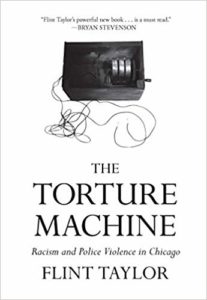
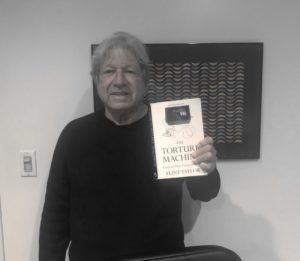
The Torture Machine: Racism and Police Violence in Chicago
Although torture is illegal under both American law and international law the USA has practiced torture for the last half century from Vietnam to Afghanistan, from Iraq to Guantánamo Cuba, and here at home in Chicago, Illinois.
President Obama refused to prosecute the torturers of the Bush era. Bush’s Vice President Dick Cheney greenlighted the torture saying we must go over to the darkside.
President Trump, who approves of waterboarding and worse, said during his campaign that torture works. It doesn’t. Tortured people will say anything to relieve their agony.
Over 100 Black men in Chicago were tortured in the 1970s and 1980s. They confessed to crimes although many of them were innocent. But in Chicago, unlike under President Obama who refused to enforce the law saying that “we must look forward not backward”, something was done about it.
Our guest attorney Flint Taylor, his office the People’s Law Office, many groups in the community, several dedicated journalists, law students, and even Amnesty International worked together and won an historic victory.
What they did and how they did it is the story told in Flint Taylor‘s new book, a tour de force, published by Haymarket Books, called The Torture Machine: Racism and Police Violence in Chicago.
For the first time in American history reparations were paid to Black persons. The torture ringleader Police Commander John Birge was sent to prison. Every Chicago public school student is now taught about what happened in their city. A monument for the victims has been put up and free college tuition and psychological counseling are available to the victims.
Guest – Flint Taylor is a founding partner of the Peoples Law Office. He was one of the lawyers for the families of slain Black Panther leaders Fred Hampton and Mark Clark, has represented many survivors of Chicago police torture over the past 30 years, and was also trial co-counsel in the landmark civil rights case against the KKK, Nazis, and Greensboro, North Carolina police in the murder of five anti-Klan demonstrators.
—-

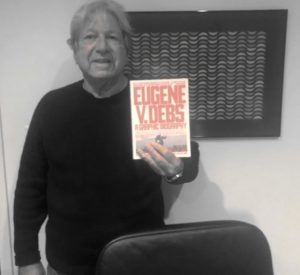
Eugene V Debs: A Graphic Biography
Eugene V. Debs, the greatest American Socialist and the foremost agitator for socialism that we have ever had , is back in the public guy eye again after a century. Back then, with Debs as it’s outstanding spokesman, socialism began for the first time to get a hearing in this country.
Debs talked about a new social order based on cooperation and comradeship. He and the newspaper “Appeal to Reason“ for which she wrote inspired a whole generation of native radicals with the great promise of socialism.
Socialism is no longer a dirty word. Google reports that the word “socialism“ got more hits than any other word last year. A 2016 poll showed Democratic primary voters “in every age group, every gender, and every race view socialism favorably.“ Candidates are openly advocating for socialism and getting elected.
In 1894 Debs, though not yet a socialist but an militant beloved labor leader, was jailed for six months after leading the nations railroad workers in a failed strike against the powerful railroad owners. He was defended by the magnificent attorney Clarence Darrow.
In 1919 Debs was again convicted, this time for violating the Espionage Act which was used against war war one antiwar activists. He was incarcerated for a second time at age 63. He was given a 10 year sentence of hard labor in a federal penitentiary in Atlanta, Georgia. His crime was making a speech opposing America’s participation in World War I.
It is the Espionage Act which will be used against WikiLeaks publisher and truth teller Julian Assange if United States Government is Able to arrest him and London where he has been granted political asylum in the embassy.
Deb’s Socialist Party of America was formed in 1901 and heralded a wave of broad popular support for the ideas of socialism. We see this phenomena currently unfolding in these dire times of permanent war and austerity.
Paul Buhle along with Attorney Dave Nance are authors of the just published by Verso Press book Eugene V Debs: a Graphic Biography.
Guest – Paul Buhle, formally a senior lecturer at Brown University, produces radical comics. He founded the journal “Radical America” and co-edited with Dan Georgakas and Mari Jo Buhle, the invaluable “Encyclopedia of the American Left”.
———-

———-
Censorship, CIA Sponsored Terror, Civil Liberties, Habeas Corpus, Human Rights, Torture, War Resister
Podcast: Play in new window | Download
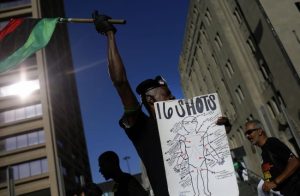
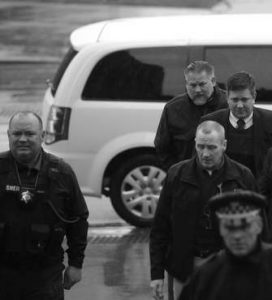
The Power of Public Outrage: Laquan McDonald’s Place in History
Jason van Dyke, the Chicago police officer who four years ago shot 17-year-old Laquan McDonald 16 times in the back, was found guilty on October 5th of second-degree murder and 16 counts of aggravated battery by Chicago jury.
This was the first time in 50 years that a Chicago police officer has been found guilty of murdering somebody while he was on duty.
The McDonald murder was massively covered up beginning with the cops who were on the job with van Dyke, the commanding officers of the Chicago police department, up to the office of the Mayor Rahm Emanuel.
Key to the conviction was video footage taken by a police car dash camera. This video was suppressed by the police, and the mayor for three years and only revealed after a massive campaign by a number of Chicago grassroots organizations. Nationally, there have been no convictions in the murders of Eric Gardner, Michael Brown, or Trayvon Martin.
Chicago is one of the most segregated cities in the USA. Recently 50 Chicago schools have been closed as well as many mental health clinics. Even the parking meters have been sold in a wave of divestment from the inner-city.
Guest – Attorney G.Flint Taylor, a graduate of Brown University and Northwestern Law School, is a founding partner of the People’s Law Office in Chicago, an office which has been dedicated to litigating civil rights, police violence, government misconduct, and death penalty cases for more than 40 years.
—-
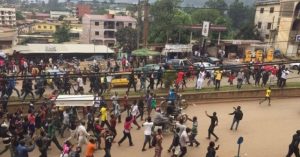

Neo-Colonial Regime Kill Peaceful Ambazonian Protesters in Africa
Ambazonia is an English-speaking territory located between Cameroon and Nigeria in West Africa. Also known as the Southern Cameroons, for most of its recent history it has been under military occupation by the French neo-colonial regime in Cameroon. A majority of Ambazonians reject the legitimacy of this regime and its military control.
In violation of an agreement to create an equal confederacy between the two autonomous states, French Cameroon has been dismantling and defunding Ambazonian systems, and pillaging its resources since the country was created in 1961.
Since December 2016, French Cameroon military has responded to peaceful protests with force, killing over 400 civilians. 200 more have been disappeared and are feared dead. More than 90 villages burnt down, resulting in 60,000 people fleeing to neighboring Nigeria.
More than 2,500 activist and peaceful protesters imprisoned, some tried in military courts, a violation of international law, and some sentenced for terrorism and other unjustifiable charges. Prisoners include prominent nonviolence advocate Julius AyukTabe and 11 of his senior aides, arrested in January 2018, and unlawfully repatriated. Julius’s appeal hearing just happened last Thursday.
On January 26, 2018—with no extradition treaty between Cameroon and Nigeria, and without a presiding judge—Nigeria forcibly handed 10 of the prisoners and 37 other refugees to Cameroon. That was in violation of international law forbidding a country receiving asylum seekers from returning them to a country where they likely face persecution. This action drew condemnation from Amnesty International, the UNHCR, the U.S. Department of State, and other leading human rights advocates. The Ambazonia Prisoners of Conscience Support Network, or APOCS, was recently formed to address this crisis.
Guest – Sphynx Eben, a founding member of APOCS and also a longtime media organizer with the Indymedia Africa Working Group. https://www.facebook.com/apocsnetwork/
——————-

——————-
Civil Liberties, Criminalizing Dissent, Human Rights, Human Trafficking, Political Prisoner, Prison Industry
Podcast: Play in new window | Download
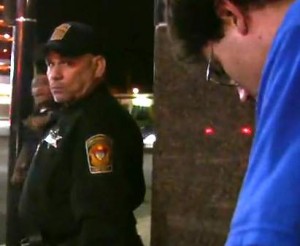
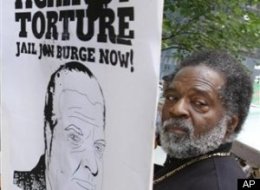
Kisela vs Hughes: Qualified Immunity
All too often government officials including law-enforcement agencies get away with gross abuses of power because they invoke the doctrine of qualified immunity. This is a doctrine which protects police who kill civilians.
In the United States, 2,934 civilians were shot and killed by police since 2015. That is nearly 1000 people a year. In most European countries the number of people killed by the police is zero.
The doctrine of qualified immunity prevents government agents from being held personally responsible for constitutional violations unless the violation was of clearly established law. This is something nearly impossible to prove.
A Supreme Court decision two weeks ago in the Kisela vs Hughes case decided against the plaintiff victim of police abuse by a 7 to 2 majority two liberal justices Sotomayor and Ginsberg dissented. They opined that the majority of supreme court judges have established what they called an absolute shield protecting police from what they labeled palpably unreasonable action that will go unpunished.
Guest – Attorney G.Flint Taylor, a graduate of Brown University and Northwestern Law School, is a founding partner of the People’s Law Office in Chicago, an office which has been dedicated to litigating civil rights, police violence, government misconduct, and death penalty cases for more than 40 years.
Guest – Attorney Ben Elson is a partner at the People’s Law Office. His practice focuses on representing victims of police and other governmental misconduct in civil rights cases, including people who have been wrongfully convicted, subjected to police brutality, and denied medical attention. He has obtained tens of millions of dollars in compensation for his clients through verdicts and settlements.
—-
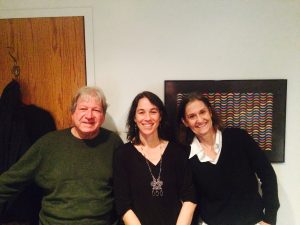
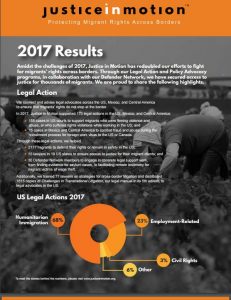
Lawyers You’ll Like: Cathleen Caron – Justice In Motion
Attorneys who represent migrant workers face a host of challenges in transnational employment litigation. Some of these challenges range from not being able to obtain a visa for clients posed to begin trial but are physically back at home in Guatemala or another country, and cannot return to testify. Or clients may be entitled to past wages but their US lawyers are unable to find them once they have left the States.
For some lawyers, it’s cost-prohibitive to keep in contact or to track down clients when the case goes to trial and forgo representing them entirely.
This is where the organization Justice in Motion comes in. Their unique cross-borer model helps advocates and migrants overcome these barriers to what they call portable justice. Their mission is to ensure that migrants who suffered exploitation abroad are able to access justice even if they have returned to their home countries. They connect advocates and defenders, and support the development of cases to ensure that transnational litigation is working effectively and smoothly on behalf of migrants. They play a pivotal role in persuading attorneys to work on cases with a transnational dimension, and to not forgo them because of legal or logistical obstacles. This has led to a significant increase in the number of advocates in the region providing transnational legal services to migrants. Justice In Motion 2017 Brochure
Guest – Attorney Cathleen Caron, National Lawyers Guild member, Cathleen is the founding executive director of Justice in Motion, and she’s also one of our Lawyers You’ll Like. Cathleen has more than twenty years of human rights experience in the United States and abroad. Prior to launching Justice in Motion (formerly known as Global Workers Justice Alliance), she was in East Timor where she directed a national needs assessment of the human trafficking situation for the Alola Foundation, chaired by East Timor’s First Lady.
—————

—————
CIA Sponsored Terror, Civil Liberties, Human Rights, Truth to Power, War Resister
Podcast: Play in new window | Download
Law and Disorder Editorials:
—-
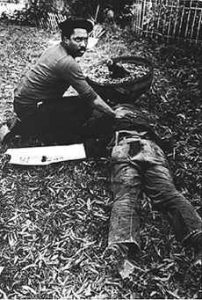
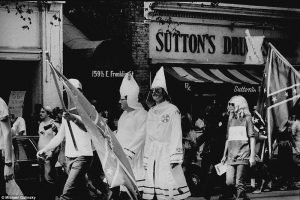
Lessons From The Greensboro Massacre
Thirty eight years ago, on November 3, 1979, 35 heavily armed members of the Ku Klux Klan and the American Nazi party drove nine vehicles through the city of Greensboro, North Carolina, and opened fire on a multi-racial group of demonstrators who were gathering at a black housing project in preparation for an anti-Klan march.
Using semi automatic rifles, shotguns and pistols the Nazis and Kukluxers fired 1000 projectiles in 88 seconds killing five march leaders and wounding seven other demonstrators.
Most of the victims were associated with the Communist Workers Party, a multi racial group which had been organizing in the south for workers rights in the cotton mills and against the Ku Klux Klan.
The Greensboro police, the Bureau of Alcohol, Tobacco, and Firearms, and the Federal Bureau of Investigation were all aware of the planned attack. Four TV stations captured the massacre on video. A reluctant local district Attorney obtained six indictments under pressure from the Greensboro Justice Fund which had been organized by the windows of the victims, and the public outcry. A six-month trial resulted in the acquittal of all six defendants.
Then a reluctant Reagan administration Department of Justice tried nine of the Klansmen and Nazis on civil rights conspiracy charges. After a three-month trial all nine were acquitted.
A year after the massacre a civil rights suit was brought on behalf of the 16 victims. It expose d the depth and contours of official involvement.
After an extraordinary dramatic 10 weeks civil trial a southern jury finally convicted a good number of the actors in the massacre. The verdict was national news.
Guest – Attorney G.Flint Taylor, a graduate of Brown University and Northwestern Law School, is a founding partner of the People’s Law Office in Chicago, an office which has been dedicated to litigating civil rights, police violence, government misconduct, and death penalty cases for more than 40 years.
—————
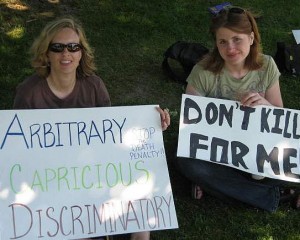
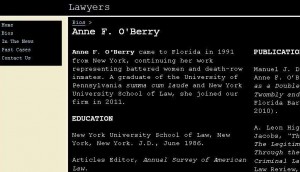
Lawyers You’ll Like: Anne O’Berry
As part of our Lawyers You’ll Like series we’re joined by attorney Anne O’Berry, she’s the Vice President of the Southern Region of the National Lawyers Guild and the author of The Law Only As An Enemy: The Legitimization of Racial Powerlessness Through the Colonial and Antebellum Criminal Laws of Virginia. While in law school, she served as Director of the Women in Prison Project at Rikers Island, where she taught incarcerated women how to prevent termination of their parental rights.
Anne clerked for federal judges in New York, New Jersey and Pennsylvania, including Judge A. Leon Higginbotham, Jr. of the U.S. Court of Appeals in Philadelphia, with whom she co-authored an article on the law as a tool of oppression against slaves and free blacks in pre-Civil War Virginia and taught civil rights and South African apartheid law at the University of Pennsylvania. She later taught Race and the Law at St. Thomas University Law School in Miami, Florida.
In the last 12 years, Anne has served as counsel at a Florida law firm that specializes in class action litigation, particularly in the areas of securities, consumer and economic fraud, as well as some environmental and privacy rights litigation.
Attorney Anne O’Berry:
- We did a lot of historical research in terms of racism and the law back in pre-civil war Virginia.
- We focused on Virginia because it was a paradigm for slavery basically in the slave laws that were in place.
- We wrote an article for publication, it was published in the University of North Carolina law review. The Law Only As An Enemy:’ The Legitimization of Racial Powerlessness Through the Colonial and Antebellum Criminal Laws of Virginia.
- Depending on your status, if you were a free white person or a slave, you were treated differently by the law.
- As an overall theme, depending on the race of the victim was that would effect what your sentence would be.
- For example, if a black woman was raped, that was not considered a crime. If you were a black person and you stole something, you would be put to death.
- It was ironic for the slave owner because if their slave was put to death, they would have to be compensated by the state.
- If the victim was black, the crime was treated less seriously than if the victim was white.
- I started out working at a firm in New York, a large prominent, Wall Street type.
- Among some people I was known as the pro-bono queen.
- I was there for 2 and a half years and the first pro-bono case was a death penalty case.
- The court ruled back then (1990s) that it was ok to execute the mentally retarded.
- I was so moved by that experience that I gave up my cushy job in New York and go do death penalty work full time.
- I ended up at the Federal Resource Center doing death penalty work in Tallahassee Florida.
- I worked for the Battered Women’s Clemency Project in Florida.
- More recently the Supreme Court did rule that it is unconstitutional to execute people who were juveniles at the time of the offense and unconstitutional to execute people who are mentally retarded.
- I believe in my lifetime we will see the end of the death penalty in this country.
- It’s just an amazing system that we have where the courts will say – yes you’ve got compelling evidence of innocence but we’re not going to hear your case.
- I would say what got me through was the victories.
- Presently, I’m working with an attorney Jim Green, who’s a prominent civil rights attorney in West Palm Beach, kind of a legend down here.
- I also some volunteer work with El Sol. It’s a day laborer center in Jupiter, Florida.
Guest – Anne O’Berry, National Lawyers Guild’s Regional Vice President for the Southern Region and a member of the Guild’s South Florida chapter. She obtained her undergraduate degree from the University of Pennsylvania in 1983 and her law degree from New York University Law School in 1986. While in law school, she served as Director of the Women in Prison Project at Rikers Island, where she taught incarcerated women how to prevent termination of their parental rights. She was a member of the law school’s civil rights clinic and an editor on one of the law school’s journals, and authored a law review article on prisoners’ rights. During and after law school, she clerked for federal judges in New York, New Jersey and Pennsylvania, including Judge A. Leon Higginbotham, Jr. of the U.S. Court of Appeals in Philadelphia, with whom she co-authored an article on the law as a tool of oppression against slaves and free blacks in pre-Civil War Virginia and taught civil rights and South African apartheid law at the University of Pennsylvania. She later taught Race and the Law at St. Thomas University Law School in Miami, Florida.
CIA Sponsored Terror, Civil Liberties, Habeas Corpus, Human Rights, Surveillance, Targeting Muslims, War Resister
Podcast: Play in new window | Download
Updates:
- Co-hosts Heidi Boghosian and Michael Smith Discuss Raza v. City of New York and Handschu v. Special Services Division Settlements.
- Renaming Law School After Supreme Court Justice Antonin Scalia
—-
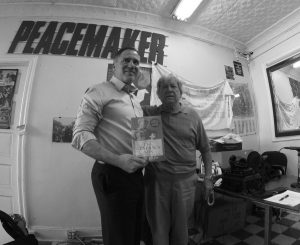
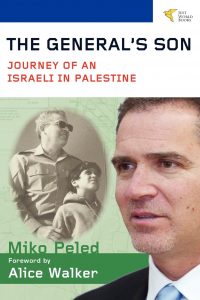
Miko Peled: The General’s Son, Journey of an Israeli in Palestine – Second Edition
Miko Peled comes from a distinguished Zionist family. His grandfather signed in 1948 the Israeli declaration of independence. His father General Matti Peled, was a hero in Israel’s victorious 1967 war against 3 of it’s Arab neighbors. Miko Peled wrote the book “The General’s Son, Journey of an Israeli in Palestine” in 2012. It is an account of his family history and his own personal political and moral evolution. He served in the Israeli Air Force. His sister’s young daughter was killed by a Palestinian in a terrorist attack. His book is considered so important that it has been republished in a new updated second edition. Peled moved from Israel and now lives in San Diego. He believes the only just solution in Israel – Palestine is for the creation of a bi-national state with equal rights for the Palestinian people. He is in New York on tour to promote the second edition of this book.
Guest – Miko Peled is an Israeli writer and activist living in the US. He was born and raised in Jerusalem. His father was the late Israeli General Matti Peled. Driven by a personal family tragedy to explore Palestine, its people and their narrative. He has written a book about his journey from the sphere of the privileged Israeli to that of the oppressed Palestinians. Peled speaks nationally and internationally on the issue of Palestine. He supports the creation of a single democratic state in all of Palestine, and a firm supporter of BDS
—-
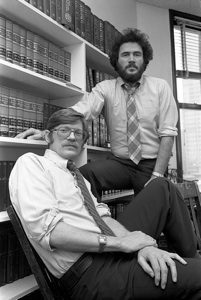
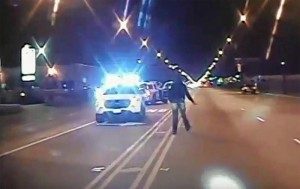
Racism Within Chicago’s Police Department
Chicago Attorney Flint Taylor is a founding partner in the People’s Law Office. He’s been engaged in police abuse litigation since the 1960s when he and his partner Jeff Haas represented the Fred Hampton family after Chairman Hampton, the head of the Black Panther Party was assassinated by the Chicago Police and the FBI. Flint then for 30 years represented the victims of the Jon Burge torture machine. Burge, through the use of torture got false confessions from more than 100 African American men, sending them to prison. Recently, under court order a video was released showing the execution by the Chicago Police of a young black man named Shaquan McDonald. In the wake of the release of the video, Chicago Mayor Rahm Emanuel was forced to fire his police chief and appoint a commission to investigate the lack of accountability and widespread racism in the Chicago Police Department.
Guest – Attorney G.Flint Taylor, a graduate of Brown University and Northwestern Law School, is a founding partner of the People’s Law Office in Chicago, an office which has been dedicated to litigating civil rights, police violence, government misconduct, and death penalty cases for more than 40 years.




















